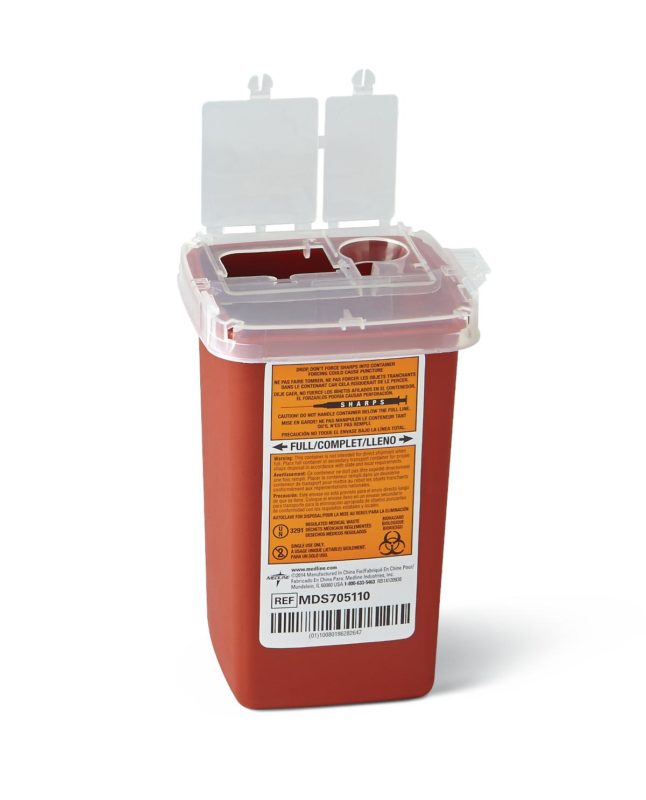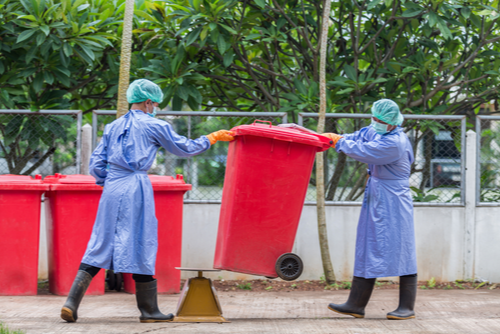Your Relied On Companion: Medical Waste Removal Services Tailored to Your Requirements
Your Relied On Companion: Medical Waste Removal Services Tailored to Your Requirements
Blog Article
Stay Compliant and Safe: How to Take Care Of Medical Waste Correctly
In today's ever-changing medical care landscape, guaranteeing compliance and safety and security when it comes to medical waste disposal is of utmost relevance. In this conversation, we will discover the numerous kinds of medical waste, the affiliated risks, the lawful demands, and the ideal methods for maintaining a safe and certified medical waste administration system.
Value of Correct Clinical Garbage Disposal
Proper medical waste disposal is of utmost relevance in guaranteeing the security and wellness of both healthcare workers and the public. Medical waste, which includes items such as used needles, polluted dressings, and ended drugs, postures significant health dangers if not dealt with and dealt with properly.

Additionally, inappropriate disposal of clinical waste can result in ecological contamination. When clinical waste is not set apart, treated, or disposed of correctly, it can find its way right into land fills or bodies of water, possibly polluting the water, dirt, or air sources. This can have detrimental results on ecosystems and human wellness, as harmful compounds may seep into the environment or be launched into the atmosphere.
Kinds of Clinical Waste and Their Dangers
The diverse series of clinical waste produced by health care facilities offers numerous dangers that need to be very carefully resolved to make certain correct disposal and stop prospective injury to public health and the environment. Medical waste can be categorized into different categories based upon its attributes and level of risk.
One type of clinical waste is transmittable waste, that includes products that are polluted with blood or various other potentially transmittable products. This can consist of used needles, syringes, and other sharp objects, as well as cells, swabs, and dressings from individuals with contagious illness. Incorrect disposal of contagious waste can result in the transmission of hazardous virus and the spread of infections.
An additional group is unsafe waste, which includes materials that are poisonous, flammable, harsh, or reactive. This can consist of chemicals, pharmaceuticals, and specific clinical devices. Mishandling or inappropriate disposal of contaminated materials can cause environmental contamination and present risks to the health and wellness of waste employees and the general public.
Radioactive waste is an additional sort of medical waste that need to be carefully handled. This waste includes materials that consist of contaminated substances, such as utilized radiation treatment resources or contaminated research laboratory supplies. Improper handling or disposal of radioactive waste can bring about radiation exposure and severe wellness risks.
Finally, non-hazardous basic waste, such as paper, packaging materials, and food waste, is likewise created by medical care facilities. While this waste might not posture significant risks, it still needs to be properly handled to keep cleanliness and prevent the attraction of bugs.
To make sure the risk-free disposal of medical waste, health care facilities must implement correct partition, therapy, transport, and storage methods. This includes making use of proper containers, labeling, and training for personnel, in addition to adhering to local policies and guidelines. By addressing the threats related to various sorts of clinical waste, medical care centers can secure public health and wellness and the setting.
Lawful and Regulatory Demands for Disposal
In order to make sure the secure and proper disposal of clinical waste, medical care facilities should follow legal and regulatory requirements. These needs remain in area to protect public health and the setting from the prospective threats related to medical waste. Clinical waste is classified as an unique classification of waste because of its possible to transfer infectious conditions and include unsafe compounds.

Some common demands consist of the segregation and appropriate product packaging of clinical waste, using authorized containers and tags, and the application of secure handling and transportation procedures - medical waste removal. Health care centers might also be required to preserve documents of their waste management methods and provide paperwork to regulative authorities upon demand
Failure to follow these lawful and regulatory demands can cause penalties, fines, and reputational damage for health care centers. It is, for that reason, necessary for medical care service providers to prioritize conformity and develop robust waste monitoring protocols to guarantee the risk-free and appropriate disposal of clinical waste.
Finest Practices for Safe Medical Waste Administration
Health care centers have to stick to market ideal techniques to make certain the effective and safe management of clinical waste - medical waste disposal services with WasteX. Carrying out these finest methods not only aids safeguard the setting and public health and wellness but additionally decreases navigate to this website the threat of prospective lawful and monetary consequences
One of the vital finest techniques is the correct segregation and control of different sorts of clinical waste. This includes utilizing color-coded containers and clearly labeling them to guarantee that each sort of waste is gotten rid of properly. Additionally, medical care centers must have marked locations for storage space and disposal of medical waste, with clear guidelines and treatments in position.
One more vital element of safe medical waste management is the training and education of healthcare staff. All personnel who take care of medical waste needs to obtain detailed training on the correct handling, storage, and disposal procedures. It is crucial to make certain that team participants know the potential dangers connected with clinical waste and are geared up with the necessary expertise and skills to handle it safely.
Normal surveillance and auditing of waste management methods is likewise essential. This includes on a regular basis reviewing waste administration treatments, performing evaluations, and keeping accurate records. By keeping an eye on waste monitoring practices, medical care centers can determine any type of prospective concerns or areas for improvement and take corrective activities as necessary.
Last but not least, medical care facilities ought to prioritize making use of eco-friendly disposal techniques whenever possible. This consists of making use of waste therapy modern technologies such as autoclaving or incineration, which can assist decrease the volume and dangerous nature of medical waste.
Eco-Friendly Solutions for Medical Waste Disposal
Executing environmentally friendly services for clinical garbage disposal is vital for health care facilities to decrease ecological impact and ensure lasting methods. Standard methods of clinical garbage disposal, such as incineration and landfilling, have actually been discovered to release harmful pollutants right into the air and pollute soil and water sources. Consequently, there is an expanding requirement for alternative techniques that are both environmentally pleasant and risk-free.
These systems make use of advanced modern technologies to safely refine medical waste within the healthcare center itself. By treating the waste on-site, transportation emissions and dangers linked with off-site disposal are minimized.
Another environment-friendly approach is the adoption of reusing programs for sure sorts of medical waste. Products such as glass, plastics, and steels can be recycled instead of disposed of in land fills. By executing partition and recycling programs, health care centers can substantially decrease their waste quantity and minimize their ecological footprint.
Furthermore, healthcare centers can check out using multiple-use medical devices and products. By selecting recyclable products, instead of single-use choices, the quantity of waste produced is significantly minimized. Multiple-use products can be disinfected and made use of multiple times, leading to cost savings basics and much less ecological impact.
Conclusion
To conclude, proper disposal of medical waste is vital for maintaining compliance and ensuring safety. Understanding the types of medical waste and their associated dangers is essential in order to apply the appropriate disposal methods. Abiding by legal and regulatory demands is crucial for avoiding penalties and safeguarding the atmosphere. Complying with ideal techniques for safe medical waste management and checking out green remedies can add to a liable and lasting approach to lose disposal in the healthcare sector.
In this recommended you read discussion, we will certainly check out the numerous types of medical waste, the affiliated dangers, the lawful demands, and the best methods for keeping a compliant and secure medical waste monitoring system - medical waste removal near me.One type of medical waste is infectious waste, which consists of items that are infected with blood or other possibly contagious materials.Contaminated waste is an additional type of clinical waste that should be carefully handled. Clinical waste is identified as a special group of waste due to its prospective to transfer infectious diseases and include unsafe materials
Following ideal techniques for secure clinical waste monitoring and exploring environmentally friendly remedies can contribute to a lasting and accountable technique to squander disposal in the health care market. medical waste disposal services with WasteX.
Report this page